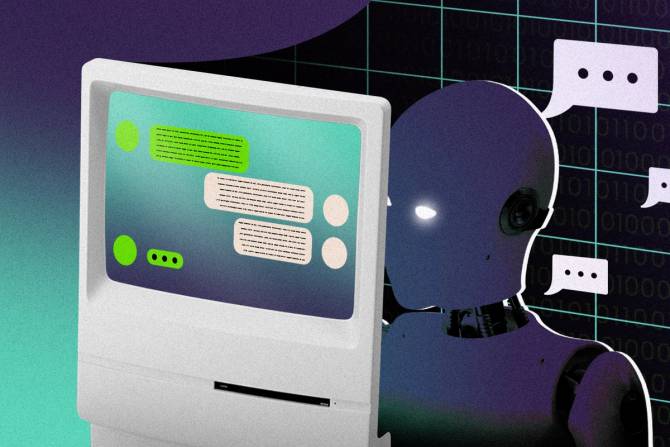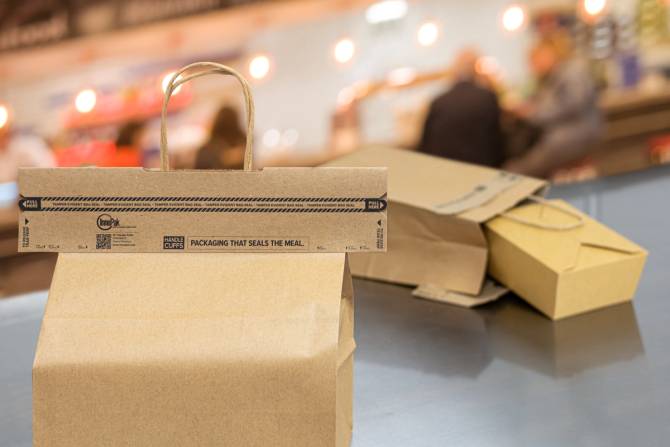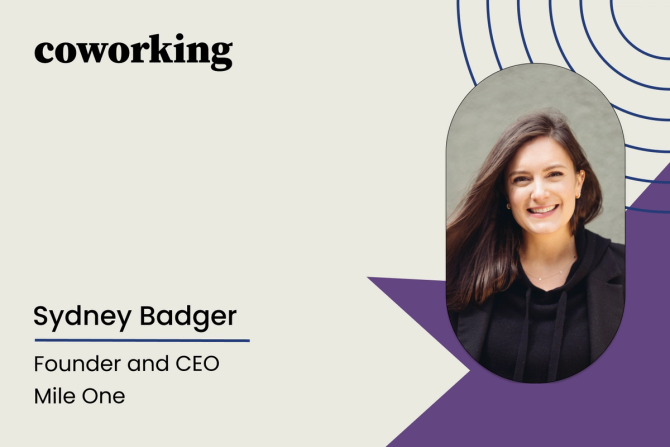Happy Wednesday. We want to get to know you, our community and readers, a little better, so indulge us for a moment: Tell us about yourself by taking this quick survey. You’ll be helping us make more of the content you’re sure to love, and you’ll be entered into a raffle for a chance to win a $250 AmEx gift card! We’d say it’s a win-win. At the very least it’s a win-chance-to-win? And we certainly appreciate it.
In today’s edition:
—Maeve Allsup, Andrew Adam Newman, Erin Cabrey
|
|
Francis Scialabba
The word “chatbot” holds something of a…negative connotation for many retail shoppers today. Interacting with a bot on a website is notoriously frustrating, slow, and unhelpful.
But the world of chatbots is changing, and fast. The scripted bots of just a few years ago are out, and there’s a new sheriff robot in town.
Today’s chatbots are software systems that use a branch of AI called Natural Language Processing to understand and respond to everyday human language. (If your mind went straight to ChatGPT, you’re on the right track!)
The widespread adoption of conversational AI could bring efficiency and improved customer experience to the retail world, addressing everything from supply-chain woes to onboarding issues. But despite the large number of AI offerings out there, the rapid evolution of retail chatbots hasn’t come without challenges.
Changing landscape
The advancement of chatbots has happened faster than people realize, Raghu Ravinutala, CEO and co-founder of conversational AI platform Yellow.ai, told Retail Brew. It was just a few years ago that rules-based bots (which were limited to pre-programmed responses and often used for FAQs) were popular, he explained.
AI chatbots, on the other hand, rely on language models (tools that analyze language and predict the most useful response), and can generate human-like responses. AI chatbots can also be trained and improved to offer better results over time.
“[Today’s AI chatbots] are very advanced,” Ravintulata explained, pointing to customer service as the top retail use case for conversational AI. “They can read sentences, they can manage context. We’ve seen companies that process 60%–70% of their customer interactions [via chatbot] with high [customer satisfaction] scores.”
Keep reading here.—MA
|
|
|
Whether you’ve slipped on a pair or not, you know Steve Madden. They’ve been creating fashion-forward shoes and styles since the ’90s, and this iconic brand wanted to take their strategy a step (or two) further.
Looking for ways to keep their iconic styles in their shoppers’ closets, the Steve Madden team went beyond designing shoes that shoppers love: They embraced Bluecore’s predictive intelligence.
Bluecore took a deep dive into Steve Madden’s story and how predictive intelligence changed their business, helping them offer shoppers fresh new fits based on their retail data. By leveraging predictive intelligence, the Steve Madden team was able to:
- boost conversion by 37% with category affinity campaigns
- reduce campaign production time by 87.5% using predictive campaigns
- elevate their repeat buyer rate by 22%
Check out the full story here.
|
|
Inno-Pak
In January, TikTok user @doordashtips2 posted a video from his car in which he said a DoorDash customer had left a measly $1 tip when placing an Arby’s order—an order the driver had not yet delivered and was rifling through. When he sees fries, he says, “Oh, man, that’s my favorite,” reaches into the bag, and eats one. “Thank you, $1 tipper,” he said in the video, which has garnered more than 889,000 views.
The driver told Bored Panda he’s been delivering for DoorDash since 2016.
But Julian Crowley, DoorDash’s director of trust and safety communications, told us in an email that the company has “strong reason to suspect this video is fake and forms part of a trend where people staged videos about dashing for social media.” He added that DoorDash is “serious about food safety” and has “robust safeguards in place to help ensure food is delivered safely.”
Whether or not that particular TikTok video is real, though, surveys suggest that delivery drivers do give in to temptation.
-
79% of food-delivery drivers admitted to eating customers’ food, according to a 2022 survey by Circuit, a last-mile tech startup. (In the same survey—let’s hope they had hand sanitizer—10% said they had urinated in a bottle while delivering.)
-
A 2019 survey by US Foods found the practice less prevalent, with 28% admitting they’ve taken food from orders.
- 85% of consumers said they’d like restaurants to use tamper-resistant labels on packaging, the US Foods survey also found.
A California law that went into effect in 2021 requires that restaurant orders delivered by third parties use packaging that is “tamper-evident,” the term for methods that don’t prevent contamination, but indicate when something has been opened.
With California often a bellwether for laws adopted in other states, packaging companies are developing tamper-resistant methods for their restaurant customers.
Keep reading here.—AAN
|
|
Sydney Badger
On Wednesdays, we wear pink spotlight Retail Brew’s readers. Want to be featured in an upcoming edition? Click here to introduce yourself.
Over her retail career, Sydney Badger has worked for Ralph Lauren and Amazon, and co-founded Public Habit, a sustainable cashmere company worn by celebs like Gigi Hadid and Hailey Bieber. Now, she’s founder and CEO at Mile One, using those experiences to establish a full-service digital platform for clothing brands and designers that aims to eliminate overproduction.
How would you describe your job to someone who doesn’t work in retail? Working directly with clothing manufacturers to optimize fashion production and operations.
One thing we can’t guess about your job from your LinkedIn profile? I spend a lot of my day texting in Chinese on WeChat with suppliers.
What’s your favorite project you’ve worked on? Launching an influencer collaboration during Covid-19 and seeing Gigi Hadid wear our clothing in New York City.
Which emerging retail trend are you most excited about this year, and why? Adoption of made-to-order/on-demand production and retail.
What’s your go-to coffee order? Oat milk latte (would prefer dairy milk, but my newborn baby isn’t into it.  ) )
Worst piece of advice you’ve received? “Just be patient.”
What was your favorite retail product when you were 15, and what’s your favorite retail product now? At 15, it was probably a Friends VHS box set. Today, it’s my Owala water bottle.
|
|
|
Send emails that drive revenue. Wanna start crushing your email marketing and boosting conversion rates? Spellbound can help. Their no-code platform helps you create interactive experiences embedded inside of your Klaviyo campaigns so you can send your audience emails that streamline the checkout process in just a few clicks. Go make magic.
|
|
Today’s top retail reads.
Early bird: While only one team could win the Super Bowl, both pre-printed championship clothing before the game itself. So what happens to all that unsold Eagles merch? (The Philadelphia Inquirer)
Power struggle: With searches for many top retailers’ permanent CEOs stretching months, the retail industry is in a leadership flux. (Fortune)
Balance sheet: Brooklinen CEO Rich Fulop shares the mistakes he made in the bedding company’s fundraising process. “Being the person to do both of those things—making all the micro day-to-day decisions, and then not getting sucked too far down the road of the ‘in 10 years, we’ll be the biggest thing’ mindset—is not easy,” he shared. (Fast Company)
About time: We all know about “work-life balance,” but have you ever thought that your working hours are in desperate need of an overhaul? Our Take Back Your Time toolkit can help you do just that. Get yours now.
Shopper shift: Consumers are a-changing—so you’re gonna need new retail strategies. Fortunately, our upcoming virtual event can help. We’re sitting down with Bolt to discuss new shopper personas, seamless checkouts, and more. Register here.* *This is sponsored advertising content.
|
|
-
Subway confirmed it is exploring a potential sale.
-
US retail sales rose 3% in January, per the Commerce Department.
-
Louis Vuitton named Pharrell Williams its next creative director of menswear.
-
Neiman Marcus Group is laying off just under 5% of its workforce.
-
Walmart is closing three US tech hubs in California, Oregon, and Texas.
-
Tuesday Morning filed for Chapter 11 bankruptcy again, after first doing so in 2020.
-
Chipotle is opening a ghost kitchen spinoff, called Farmesa Fresh Eatery, in California.
|
|
Catch up on the Retail Brew stories you may have missed.
|
|
|
Written by
Maeve Allsup, Andrew Adam Newman, and Erin Cabrey
Was this email forwarded to you? Sign up
here.
Take The Brew to work
Get smarter in just 5 minutes
Business education without the BS
Interested in podcasts?
|
ADVERTISE
//
CAREERS
//
SHOP 10% OFF
//
FAQ
Update your email preferences or unsubscribe
here.
View our privacy policy
here.
Copyright ©
2023
Morning Brew. All rights reserved.
22 W 19th St, 4th Floor, New York, NY 10011
|
|








